Trevor “Trevz” Bayack, The New Pop
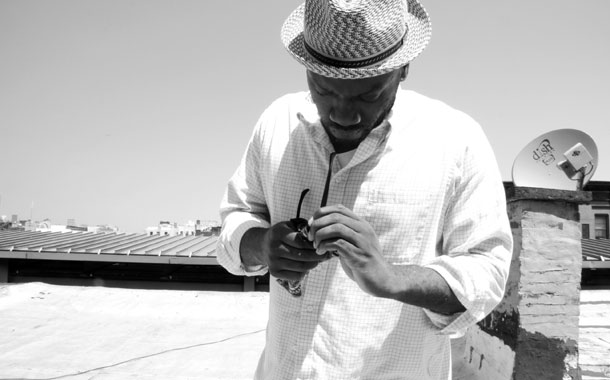
Trevor “Trevz” Bayack is a Brooklyn-born filmmaker who produces mini documentaries for the web. In 2005 he formed the online video magazine The New Pop, and along with partners Tone and Texas made a name for it shooting raw, immersive footage and photos of concerts, art shows, underground parties and more, culminating in 2008 with URB magazine recognizing The New Pop as a “Next 100” video blog pioneer.
In 2011 Trevz is as busy as ever, with The New Pop having evolved into a full-on video production company specializing in riveting short-form web documentaries.
I met up with Trevz one rainy evening at a pub in Brooklyn to discuss his recent creative endeavors and to get his thoughts on the state of the ever-changing New Media landscape.
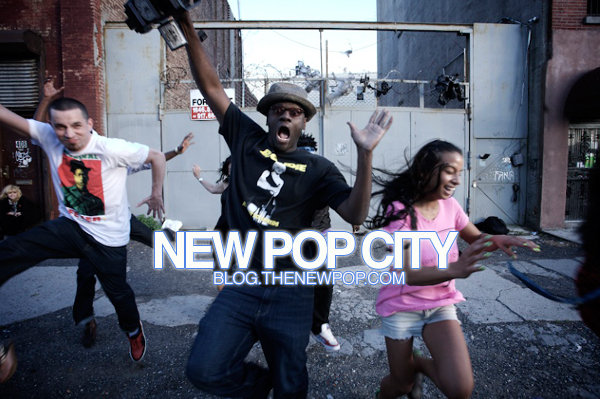
Tell us a bit about your background & your influences, and how that led to you forming The New Pop…
Well, let’s start with the site itself—one thing I’ve always been really interested in is movements—artistic, entrepreneurial, musical, they’ve always fascinated me. Back in the 80s I read a lot of books about the punk scene, as well as the art scene that was going on at that time. That was a time that I really looked at with admiration.
By the early 2000s I was hanging out with a lot of filmmakers and doing a cable access show—I didn’t really know how to edit, I didn’t really know how to do real production, and there was one editor named Ajit Anthony, who showed me the ropes with editing, and I thought, “Hmm, maybe I could do this myself.”
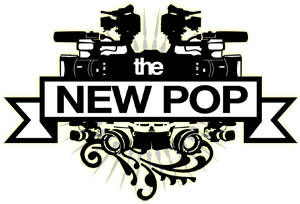 I started a site for actors called Scene Interactive, which was basically online video casting. It’s still up, I’m not a partner anymore, but that was the impetus that led me to doing The New Pop, because I left that company with the knowledge of how to edit, and how to shoot.
I started a site for actors called Scene Interactive, which was basically online video casting. It’s still up, I’m not a partner anymore, but that was the impetus that led me to doing The New Pop, because I left that company with the knowledge of how to edit, and how to shoot.
The idea of documenting a scene and giving a voice to independent artists and entrepreneurs really appealed to me. Coming from a production background, I knew how expensive it was to create video.
Video to me is the storytelling medium of our generation. In 2005 you wouldn’t really think about it that way, but back then the average artist wasn’t thinking in terms of video to tell their story…unless they were thinking of a music video.
So I thought, OK, let’s do this on the cheap, I’ll invite my friends, follow them around, shoot short portraits, and….that was the birth of New Pop!
I originally called it The New Pop Sensation, because I was playing on words, like “Let’s make it really corny,” like Britney Spears, etc.
How did you bring in Tone & Texas?
Well, originally I would find my artists through MySpace, back when MySpace was the site for musicians. So I would reach out to musicians and say, “Hey I love your music, can I do an interview or a 3-minute music clip?”
Eventually I started seeing that MySpace had more than just musicians, they had photographers, they had graffiti artists…Tone was one of the photographers, and I was just blown away by his work. I was like, “this guy has the eye.” I reached out to him….I think that’s how it happened!…I was doing this video thing called MySpace Heroes, it was 7-8 talented people that I found on MySpace, I wanted to do a montage video with them….and Tone was one of those artists. We shot it in the studio, and….it was love at first sight! (laughs)
Texas, a wonderfully talented photographer in her own right, I met through Tone—who I think met her through MySpace!
We would move as a unit, documenting the music, art and fashion scene downtown and in Brooklyn on a nightly basis. Texas and Tone would take photos, and I would shoot video which would all be posted on the site within that week. Our photos and video always made people wish they were there. To this date there still isn’t a unit that moved like we did.
Those years together as a crew at The New Pop were some of the best moments of my life to date. We have since parted ways, but continue to be the best of friends and be supportive of each others’ projects.
MySpace had music and the means to embed video, it gave voice to the average man—kind of what I wanted to do with The New Pop.
When you were growing up, did you have any interest in getting into film? Did you go to school for it or anything like that?
I went to school for television and communications, in college. When I was a kid I remember the first thing I ever wanted to do professionally was be a cinematographer. After that, I wanted to be an athlete—I was pretty into sports—football, basketball.
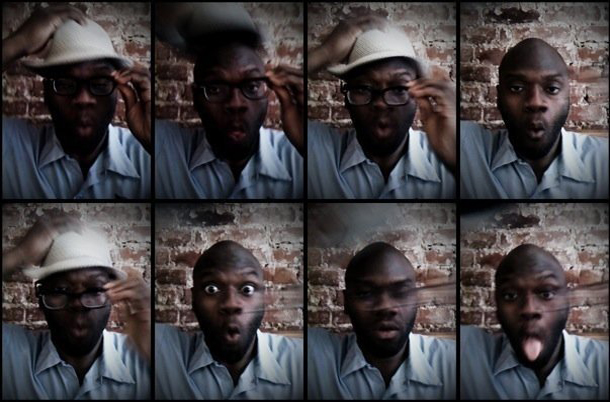
You talk a lot on your site about New Media—how do you personally define New Media, and what is it that differentiates it from the more conventional forms?
New Media to me….it’s better to point out who they are….MySpace, Twitter, Facebook. I did web design in 2000 and I guess that’s New Media but to me it takes off with MySpace around 2005, 2006.
MySpace had music and the means to embed video, it gave voice to the average man—kind of what I wanted to do with The New Pop. Before if you were an artist you had to go through distribution channels. MySpace empowered the individual—it was all about DIY, reaching out to a huge or not-so-huge audience.
So to me that’s the definition of New Media—the Mom & Pop, indie artists—the DIY artists…being able to cut out the “middle man,” which I know is such a clichéd term.
Everything went into hyperdrive when MySpace came into existence. It evolved from music, to video, to art and fashion. The New Pop wouldn’t be here if it weren’t for MySpace, that’s what launched us, or at least, our “glory years.” (laughs)
That’s the short answer, I feel like there’s a longer answer in there somewhere, but that’s the easiest way to put it.
The New Pop sits down with multi-platform artist Anthony Michael Sneed during his pop up art exhibit titled “Hell For Hire,” and explores the methodology behind his sometimes controversial approach.
On your blog you refer to New Media videographers as “the quintessential avant-garde artists of our generation.”1 Could you talk about that a little bit?
Well, avant-garde means that you’re pushing the envelope, you are rebelling against what was there before. Producing work that is both non-conformist and socially edgy.
When you look at Last Night’s Party, or The Cobra Snake, these are the new wave of avant-garde artists. Typically they would be looked down upon by traditional media. These guys were basically giving voice to a scene with their still cameras, and it was new. They were saying “How can I tell what’s going on in my world, on a nightly basis.” I mean, I wouldn’t really consider it my world, I consider myself something of a voyeur, I’m not really part of these scenes so much as I just enjoy artists, I enjoy people. I consider myself a person who looks in…and that’s what they were doing, they were turning their lens on these scenes and giving them a voice.
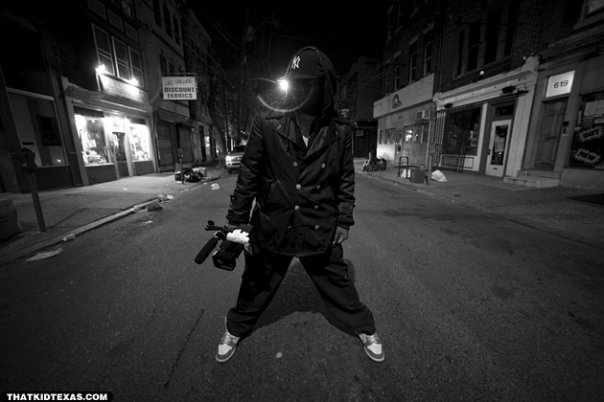
As it evolved to video…basically when there’s a revolution in any medium, basically there’s a whole support infrastructure that grows around it. That’s when you know you’ve got something new.
Going back to Myspace, you had the platform for embedding your video, then you had the photos supporting it, and then you had the music. Today you have all these artists that wouldn’t be around if it weren’t for New Media.
Now it’s becoming something where Old Media has one eye open, they’re catching up.
I think the avant-garde artist asks, “How do I tell this story, how do I do it in a different way. Do I have anything to do with what came before me?”
“Whorehouse 3 is a party where the underground black punk heads and GBLT scene come to party in one huge loft. The party was pretty crazy, just as it started to really kick in and Ninjasonik started to perform the cops pulled the plug. ” – The New Pop
I think for me, working for ten years on film sets, I have friends even to this day where I tell them what I’m doing, and it’s completely foreign to them, and they look down on it in a way.
Really, even nowadays?
Well, in the last year or two, they’ve started paying attention because their budgets are being cut, and there are more brands pushing out these videos that are done on DSLRs. More budgets are coming to the world that I’m occupying. Personally, now I’m often prepping, working and finishing jobs simultaneously, whereas a year ago I might go a whole month without working….and before that, I might go months where I was only working on my own stuff!
Everything I’ve done in the last year has been for a client. So there’s a shift going on, there’s something happening.
A Profile on NYU Stern Undergraduate Dean Geeta Menon by The New Pop
Artists are being born out of a new medium. Some people might say, “Oh, that’s not really edgy,” or “if it’s branded, it’s not really art,” but I think the medium itself is avant-garde, even if some of the pieces themselves are not.
It’s interesting you say that, because it’s been said that what makes something avant-garde is not the content but the medium of the work itself. Someone could argue that a lot of the content in the New Media videos is stuff that’s been done before, but you were definitely on the vanguard of leveraging this emerging medium of the web video…
Ha! It’s funny because I debate that with myself all the time…I steal like crazy from Old Media, and I’ve written posts about how no one is truly original, but what I think differentiates my work is that I’m taking what’s been done in other mediums and bringing it into this medium…and that alone adds a fresh, novel feel to it…
I think it comes down to just doing good work. You do good work, and you’re passionate about it, you’re going to succeed. The X factor is how long it takes…
One thing you’ve written about is how the social media landscape has changed immensely over a very short period of time:
“Six years ago . . . Myspace was all the rage, Youtube was just getting started, and being a videographer meant that you were either shooting corporate instructional videos or weddings. Today most serious brands have their own list of go-to videographers. Video on the web is today’s most powerful medium, and videographers are to social media, what photographers were to publishing.”2
…what implication has this change in the social media landscape had for the work that you do?
Well, I wouldn’t be making a living it wasn’t for the way it’s changed. Although there’s two things that have happened—on one hand, New Media has become more universally adopted and accepted, on the other hand my own work has evolved—it’s become less indie, and less ego-driven.
The videos that I used to do were all about “let’s party, let’s hang out, I’ll bring my camera, let’s document our lives,” but I feel that my videos have evolved to being more branded, more professional, more efficient and refined in the storytelling. In a lot of ways I’ve adopted a lot of the rules of traditional media.
That has a lot to do with my first clients, they taught me the value of brevity in the movies—makin’ ‘em short, getting the message out.
Leica Portrait: Gigi Stoll. Trevz shot and edited this video for Leica, in which fashion model turned photographer Gigi Stoll discusses her diverse portfolio as well as some of the challenges she faced making the transition to photography.
The other important change for me is in the medium, how it’s been accepted. At first it was like, “Ok, these kids are running around, documenting what’s fun, that’s cool, but what can we do with it?” Then the indie brands, the mom & pop boutiques, they got it first, they were like, “let’s have you document our opening, our exhibit, etc.”
The Palms : The Experience. Promotional Video Flyer shot and edited by Trevz
Now the brands are saying, “that’s cool,” and they realize that they have the web, they need video, “let’s find the people who do it the best and do it the coolest.” That acceptance has been everything for me. I would still be doing it if I wasn’t getting paid—the first 3 years I was only getting paid every tenth video. But…it was stress, man! (laughs) Makin’ a living…..
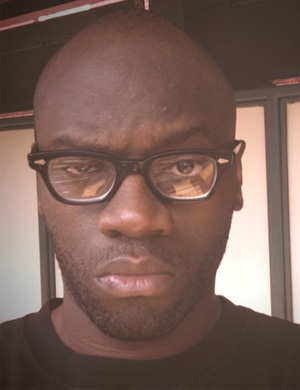 How were you making a living during that time?
How were you making a living during that time?
I was a chauffeur for the first 2 years, and I did a few freelance gigs on sets—I worked for The Apprentice a little bit. When I finally started getting regular work coming in, I thought it would be easy street (laughs), but I still occasionally have a bad month, you know? And then I’m panicking (laughs)….
To me that’s the toughest thing about being an artist sometimes—taking a leap without a net. It can be so hard to be creative when you’re worried about money. This is my 6th year, and I went through 5 years of worrying and stress every other month. Thank god I have a really cool landlord!
That’s something that people really need to appreciate, how hard it is to make a living, and take that chance. To struggle in order to tell your story, and hopefully one day have it be appreciated.
What are your thoughts on balancing the need to be creative with the need to make rent?
If I was going to lean to one side, I’m definitely more the one to throw all of my eggs in one basket. The last 5 years, I knew I was going to do whatever it takes to make it as a videographer. That can be rough sometimes, telling your landlord that you’re going to be late on rent, or worrying about losing your apartment, but if you love something enough, you’re willing to put up with all of that….and you have to be willing to put up with all of that!
I do think it’s smarter to have a day job, to have a skill you can hold on to…and however long you think it’s going to take to make it, times it by four!
Even now, when someone says they’re going to pay you in 2 weeks, they’re going to pay you in 6 weeks. Even now, working regularly, whatever can go wrong, will go wrong.
You know, I think it comes down to just doing good work. You do good work, and you’re passionate about it, you’re going to succeed. The X factor is how long it takes…
The problem is that people quit. I heard a quote by Thomas Edison the other day, “Many of life’s failures are people who did not realize how close to success they were when they gave up.”
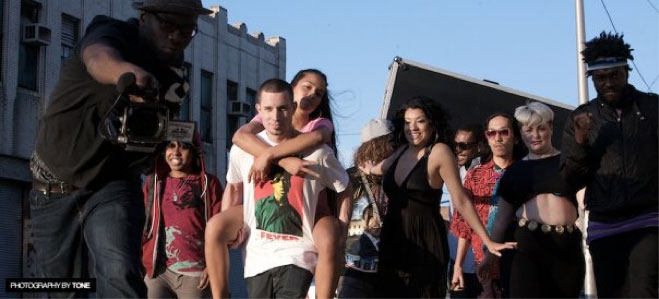
That’s one thing I love about all the people that I’ve filmed over the years, especially the people that came up using the web as their voice, there’s no lack of passion. And around New York, man, it’s beautiful…all the artists I’ve met and filmed. I feel that 10 years from now people will look back and say, “Man, something was really happening”…..and it was all fueled by social media.
Social media really fuels DIY and the arts. That’s kind of the story that I want to tell.
I’m a total hermit-loner type of guy, even though I love people. I would sit in the corner and just look at people, not really talking. Don’t get me wrong, I’m a friendly person, but I thrive really with one-on-one interaction. Social media enabled me to find the people that I get along one-on-one with really well, and allowed me to be in a place like a club or a venue, where I would normally feel totally alienated (laughs).
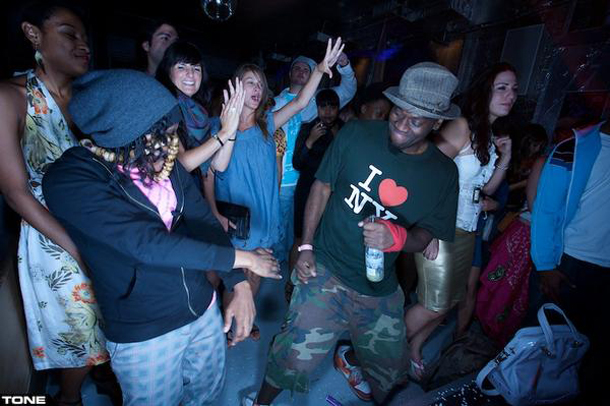
Everybody found their voice through social media. Even photographers, it enables them to share what they do, and be inspired by others, and build a network.
It’s a lovely thing man….(sniffles)…I’m going to cry! (laughter)
On one hand social media gives artists exposure that they’ve never had before. On the flip side of that, is it harder for an artist to incubate and find their own voice before being thrust into the public eye?
(pauses) Back in the day, when I traveled to Atlanta or someplace like that, you would hear completely different sounds, completely different music, completely different style…than what you’d hear in New York. Even when I traveled from Brooklyn to the Bronx as a kid, you could tell the difference—“This is a Bronx kid. This is a Queens kid.”
Now, everything I’ve observed regarding pop culture coming through New Media, is very similar. I saw a video that was shot in the Philippines about this coffee bar/bike shop, and the first few minutes I thought it was shot in Portland or something. The kids were dressed exactly the same as kids dressed here, the music and the tone of the video was very similar to if it had been shot here…the only thing that was different was that it was all Asian kids….and it could have been Asian kids in L.A.!
So there’s something that could be said for that, but at the same time I still feel that there are little ways within that homogeneous state that people are finding their own way to express themselves individually. People always want to be different.
Directed/Edited & Produced by Trevor “Trevz” Bayack
Director of Photography: Marc Miller
Additional Camera: Trevz
Assistant Director: Brian Butnick
Motion Graphics: Trevz
Overall the honest answer is, “Yeah, everything’s kinda’ the same.” Earlier in the year I realized that my rates were going down, and I realized that it was because there were now all these people doing the exact same type of videos. So I thought, what do I have to do to further differentiate myself? So I learned After Effects, and am going more into the professional side of things, and progressively, my rates have started going up again!
I do think that people find a way to distinguish themselves within New Media, but it’s tougher…it’s a moving target.
Even more than the video or New Media aspect, it’s about finding the passion in people. That’s what keeps me doing what I do.
The landscape has changed so much in the last few years, you were the forerunner of videoblogging and shooting parties, you made a name for yourself doing that, but now there’s a million trust fund kids running around with cameras who will shoot a party just for the free access and drinks. How do you differentiate yourself from this new wave of videographers?
Well, those guys are not getting the corporate gigs, so me, I’m not really competing with that group. I see the people who came up right behind me, they are competing with that group. I’ve built relationships, people know my work, and I’m reliable, and so…I’m OK!
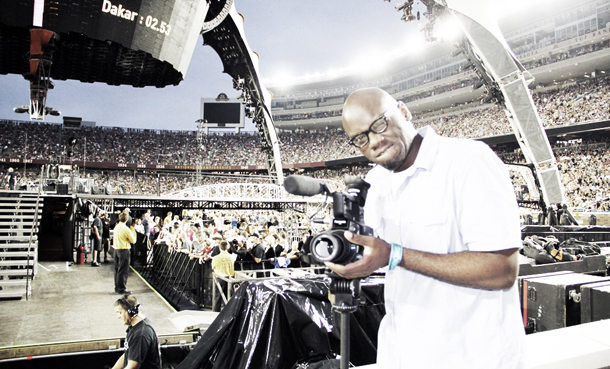
My advice to people just starting out, and I wrote about this on my blog, was “don’t shoot parties!” (laughs) …unless you really love ‘em, and you want to do it, and you have a relationship with somebody. Because there’s so many people out there that do it really well, or will do it for free, that it’s difficult to make good money.
You have to be patient, do good work, build relationships. And you have to maintain your integrity.
Are there any videos in your portfolio that you’re especially proud of, or that have a special meaning to you?
All of the early videos have a special meaning to me in terms of sentimental value. The Memorial Day ’08 video—Texas and I spent three days going from party to party and running into friends and interesting people—at one point we ended up in a hot tub with a bunch of naked people, and ended up on a rooftop.
All the ones that were us as a group hanging out and having these random adventures. I don’t know if I’ll ever match what went on there…I do this thing called Wayback Thursdays, it’s one day where I go back and look at my old videos and write about them, and I think about what was going on in that time. Half those videos were just about us having a blast, they weren’t about us getting paid…we wanted to get paid, but that wasn’t what it was all about. Holidays we would just stay out all night and shoot people, interact with them.
The ones that really stand out would be Memorial Day ’07, P.S.1, the first one that me and Tone did together—we went to a party in Philly. I think the most memorable ones were the New Year’s Eve, New Year’s Day videos. There were a lot of other great ones too—we were filming day in, day out, so it’s hard now to say where things died down or picked up again.
The early videos I did were very raw, and carried the energy of this New York art scene, and I was proud of them for those reasons. The later videos I’m proud of because they’re more professional—nowhere near where I want them to be, but I can look at them and say, “It’s not just about featuring these people, but about telling their stories with dignity and in the most professional way possible.”
Are there any recent or upcoming projects that you’re excited about?
Recently I’ve worked with Leica, they make lenses and cameras, and I’m really proud of that series. It’s a series profiling legendary photographers, and telling their relationship with the camera.
Leica Portrait: wowe Trevz shot and edited this video for Leica, which features an interview with legendary photographer wowe (Wolfgang Wesener), who has photographed some of the most iconic individuals of the past two decades.
I’m collaborating on a web series with Digital Marketing Consultant Luna Vega. This will be my first personal project in a very long time. The web series promises to break the online video mold in terms of its interactivity, engagement and social relevance.
[Update: The pilot episode of Pluggedin TV is now available to watch at The New Pop.]
In general, anything I love anything I do with artists.
One thing I can say is that it’s very rare that I get projects that are not interesting to me. Somehow, because of the relationships I’ve formed, the people involved are all artists too and they kind of do the same thing.
There are all these stories, man, and I love to listen. And it’s funny how if you ask the right questions, and you get people to talk about what they’re passionate about, then you can find that common ground, and you can really bond with them on that level.
I think that’s the key thing—even more than the video or New Media aspect, it’s about finding the passion in people. That’s what keeps me doing what I do.
SCOPE New York 2011 : The Night Event Produced by Artists Wanted. Video production by The New Pop
The impression that I got from what you’ve been saying was that your appreciation of New Media was that it is allowing people to be heard, people who are passionate but might have been lost trying to go through the traditional media channels.
That’s definitely what it was, but I’d add to that and say that, whereas a news reporter might be reporting on people and current events, what you and I are doing in our interviews is finding what it is about these individuals that really drives them, what defines them on a deeply personal level.
I had an interview with this artist the other day, and everything we talked about involved one or more of his passions—his art, his music. Well…we did talk about the beverage that was sponsoring him, and that wasn’t as passionate! (laughs) It came off as a bit disingenuous.
Luckily, when it comes to brands in New Media, I think that for the most part they see the value in allowing the artists to retain their own voice. Most of the videos I post, the branding is at the very end. Whereas, a lot of Old Media wouldn’t let you have the content without inserting the brand and the message within the video itself. So, a 30-second video, it has to be about the product itself, it can’t be about the guy’s passion…it might be, but very rarely…it would have to feature some kind of product placement.
That interview, the brand didn’t really get it, so they wanted to make sure that the brand was mentioned throughout the video. Personally, I think it feels more authentic to have the interview with the artist, and then just tag the brand at the end. Or, with Leica, the Leica is their passion, so it felt natural—we’re interviewing people who actually shoot with that camera.
Leica Portrait: Paul S. Bartholomew. Commercial photographer Paul S. Bartholomew specializes in architecture photography. In this video directed by Trevz he shares his thoughts on the informal as well as the formal approaches to his craft.
I think that’s one of the key distinctions between New Media and Old Media—brands just want to be associated with the telling of the story, rather than intruding on it or getting in the way of the artist’s voice.
The bigger companies may not get this, but as the niche circles get it, and attract attention, it will spread. I’m seeing that happen again and again.
New Media is pushing a new paradigm—We’re telling the story, we’re keeping the integrity…and you have to abide by our rules!
We have to push that agenda, to keep the integrity. And I think that’s what social media is really about—what can be more genuine than someone tweeting about what they like to their peers? Saying “hey, I just tried this, check it out.”
But, just to play devil’s advocate, couldn’t you argue that mediums like Twitter are just another channel for potential advertising? Celebrities tweeting in accordance with sponsorships or partnership deals?
Yes, but you can tell when it’s genuine…for example if it’s your friend tweeting about something they like, vs. some paid spokesperson.
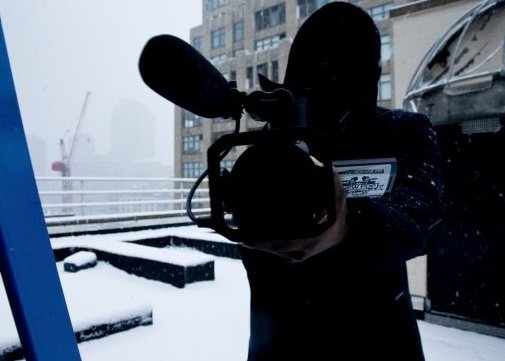
How long does a typical video takes you to put together?
It usually takes about a week to ten days per video. The chunk of it happens in a day or two, the rest is just revisions and tweeking. People say I am fast, it feels normal to me and since I don’t work with other editors I don’t really have a reference.
You mentioned in your Videographer’s Guide that one trick you use to maximize the short story format of a video is to mimic the story arc of a song. Could you elaborate on that approach?
Well, it’s about the feeling, and building a certain emotional momentum– you start, you go up, you go up, and then you take a break—which is what the bridge is…then you reprise, and then you really bring it home, about 2/3 of the way in, that’s the part that really nails the viewer, the breakdown, and then once they get it you bring them down.
I can’t imagine not having music as my inspiration. Most of the time I can’t edit without a good song.
You do good job of putting music to your videos. Does that process differ from project to project? Do you have clients that tell you “here, score to this?”
I noticed that for one of the videos you did about Love Brigade, you actually had the song “Love Brigade” playing.
Well, that was a personal project. In that case, I actually researched songs related to the phrase “love brigade.” A lot of times when I’m doing a video about a specific topic, I’ll do that—I’ll go to Google and type in the phrase, to see if there are any songs with the same name—because, often if the titles are the same, the stories will be similar.
Nine out of ten times I’ll find the music. I’ll go to Jamendo.com and I’ll spend an hour or two, before I do the edit, just listening to music. Eventually I’ll find something where I go “wow, that’s telling the story I want to tell.” Once you do that, it’s almost uncanny how the words will match up to certain things that I shot.
I’ve been trying lately to approach things from an alternate angle, i.e. without music, which is harder but it can really allow you to get into a person. It’s difficult, but there’s a way to make it work.
I love music, but even so I’m really particular about how it’s used in video. Maybe not short videos, but definitely movies. I tend to resist it when I feel like a director is using music to tell me overtly how I should be feeling during a certain scene—you know, something sad happens to a character, and suddenly this very wistful, sentimental song comes on.
Ha! I used to be guilty of that. I think it’s fine to be sentimental, but what I’m not fine with is manipulating the audience. I hear you, sometimes you really want to be emotionally present for a scene, but then the music comes on, and you start backtracking because you know the song is trying to take you there anyway!(laughs)
It takes a lot of experience, to get to a point where you as the filmmaker can find the right balance….one thing that I’ve really enjoyed about New Media is witnessing people figure this stuff out.
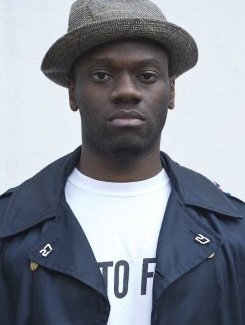 You were written up in URB back in ’08, I was curious to know if that exposure brought in more work for you or changed anything.
You were written up in URB back in ’08, I was curious to know if that exposure brought in more work for you or changed anything.
It wasn’t the article that launched a thousand clients. But it is one of the brighter patches in The New Pop brand cloth. I point to that and people know that I have been around the block and was there from the beginning.
Keep up with Trevz at Blog.TheNewPop.com
1 The Videographers Guide to not Falling on Your New Media Face – The Avant-garde?
2 The Videographers Guide to not Falling on Your New Media Face, Chapter 2





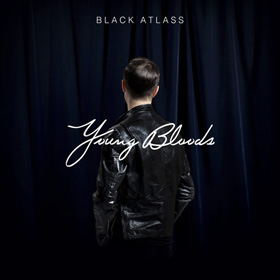

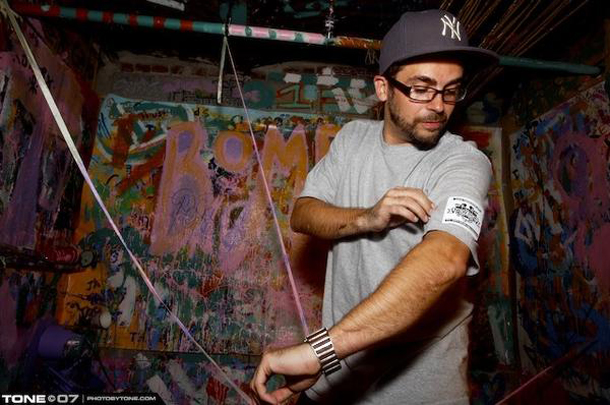
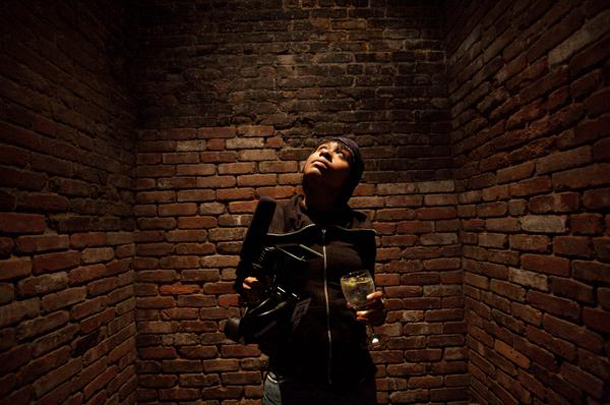
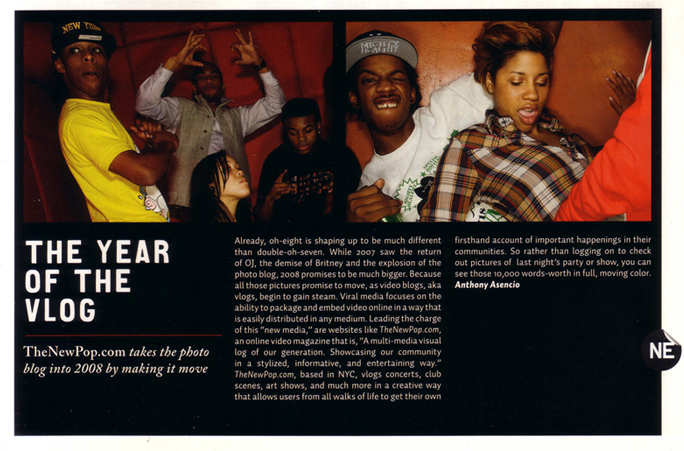

610 Comments
Big thumbs up – thanks!